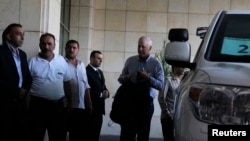UNITED NATIONS —
U.N. Secretary-General Ban Ki-moon says a U.N. team of experts began work Monday in Syria investigating whether chemical weapons were used in at least three locations during the country's on-going civil war.
The U.N. chief established the team of scientific experts from the Organization for the Prohibition of Chemical Weapons and the World Health Organization in March, but until now they had been unable to enter Syria because of unresolved issues with the government.
On Monday, Ban Ki-moon told reporters the team had entered the country and started work to determine whether chemical agents had been used.
“This is the first probe of allegations of the use of weapons of mass destruction in the 21st century. I firmly believe that an effective mechanism to investigate allegations of the possible use of chemical weapons will help deter their future use," said Ban Ki-moon.
Ban said that as agreed between the U.N. and the Syrian government, the team would conduct its activities for up to 14 days and that could be extended upon mutual agreement. He reiterated that in order to credibly establish the facts, the mission must have full access to the sites of the alleged incidents.
The mission will try to establish only whether chemical weapons were used, not who used them.
The United Nations has said one of the sites is Khan al-Assal in Aleppo province. In March, the Syrian government accused rebels of using chemical agents in Khan al-Assal and asked the U.N. to investigate.
The two other sites have not been identified, but are likely to be from a list submitted to the U.N. by Britain, France and the United States. The Syrian government has resisted allowing inspectors to visit these other sites and held up the mission’s arrival in Syria for months over the issue.
The secretary-general also expressed his growing concern over the spiraling violence in Egypt, where the military has vowed it will not tolerate anti-government protests seeking the return of ousted President Mohamed Morsi.
"I strongly condemn attacks on churches, hospitals and other public facilities. There is no justification for targeting civilians or destroying infrastructure and property so important for Egypt's future. Preventing further loss of life should be the highest priority. I urge all Egyptians to exercise maximum restraint and resolve differences peacefully," he said.
The U.N. leader said the Muslim Brotherhood should have more political space and that Morsi should be released from detention.
U.N. political chief Jeffrey Feltman is in the region and will hold wide-ranging talks starting Tuesday with a focus on how the world body can best support efforts to restore peace and advance reconciliation in Egypt.
The U.N. secretary-general is just back from a visit to Jordan, Israel and the West Bank. He said the U.S. push to restart direct Israeli-Palestinian peace talks is an opportunity that must not be lost.
Ban said achieving agreement will require vision and courage along with sacrifices, understanding and leadership from both sides. He said the U.N. would continue to work to help find a solution that would benefit both Israelis and Palestinians.
The U.N. chief established the team of scientific experts from the Organization for the Prohibition of Chemical Weapons and the World Health Organization in March, but until now they had been unable to enter Syria because of unresolved issues with the government.
On Monday, Ban Ki-moon told reporters the team had entered the country and started work to determine whether chemical agents had been used.
“This is the first probe of allegations of the use of weapons of mass destruction in the 21st century. I firmly believe that an effective mechanism to investigate allegations of the possible use of chemical weapons will help deter their future use," said Ban Ki-moon.
Ban said that as agreed between the U.N. and the Syrian government, the team would conduct its activities for up to 14 days and that could be extended upon mutual agreement. He reiterated that in order to credibly establish the facts, the mission must have full access to the sites of the alleged incidents.
The mission will try to establish only whether chemical weapons were used, not who used them.
The United Nations has said one of the sites is Khan al-Assal in Aleppo province. In March, the Syrian government accused rebels of using chemical agents in Khan al-Assal and asked the U.N. to investigate.
The two other sites have not been identified, but are likely to be from a list submitted to the U.N. by Britain, France and the United States. The Syrian government has resisted allowing inspectors to visit these other sites and held up the mission’s arrival in Syria for months over the issue.
The secretary-general also expressed his growing concern over the spiraling violence in Egypt, where the military has vowed it will not tolerate anti-government protests seeking the return of ousted President Mohamed Morsi.
"I strongly condemn attacks on churches, hospitals and other public facilities. There is no justification for targeting civilians or destroying infrastructure and property so important for Egypt's future. Preventing further loss of life should be the highest priority. I urge all Egyptians to exercise maximum restraint and resolve differences peacefully," he said.
The U.N. leader said the Muslim Brotherhood should have more political space and that Morsi should be released from detention.
U.N. political chief Jeffrey Feltman is in the region and will hold wide-ranging talks starting Tuesday with a focus on how the world body can best support efforts to restore peace and advance reconciliation in Egypt.
The U.N. secretary-general is just back from a visit to Jordan, Israel and the West Bank. He said the U.S. push to restart direct Israeli-Palestinian peace talks is an opportunity that must not be lost.
Ban said achieving agreement will require vision and courage along with sacrifices, understanding and leadership from both sides. He said the U.N. would continue to work to help find a solution that would benefit both Israelis and Palestinians.









